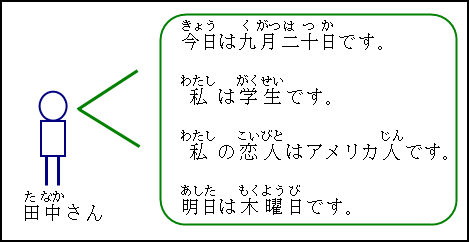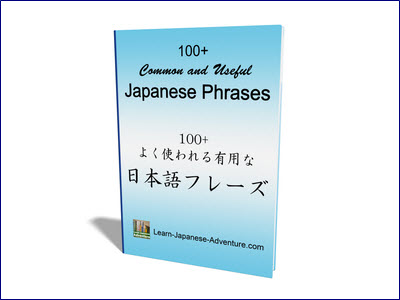- Home
- Basic Lessons
- Japanese Particle to
Quoting What Someone Said Using
Japanese Particle と (to) -
Free Japanese Lessons: 27
You have learned the one function of Japanese particle と (to) when you are taking action with someone in lesson 16.
Another common usage is to use it for quotation in a sentence. That means you are repeating or quoting what another person has said.
The Japanese verb for "to say" is 言う or いう (iu).
Change it to masu-form, it becomes いいます (iimasu). And the past tense is いいました (iimashita).
Quoting What Someone Said
Therefore to quote what someone has said, you can use the following sentence pattern...
Speaker は 「Sentence」 といいました
So if Mr Tanaka says something like "きょうはくがつはつかです", you can quote him using the above sentence pattern as...
- たなかさんは「きょうはくがつはつかです」 と いいました。
tanaka san wa 「 kyou wa kugatsu hatsuka desu 」 to iimashita
Meaning: Mr Tanaka said "Today is 20th of September".
This is actually a direct speech. What Mr Tanaka just said was put in between the quotation mark 「」.
However, direct speech is usually used in writing and not in speaking because you cannot see the quotation mark when you are speaking.
In speaking you have to use indirect speech to convey what someone has said.
Since you cannot see the quotation mark in speaking, you have to change the sentence of what someone has said to plain form, as shown in the following sentence pattern...
Speaker は Sentence(Plain form) といいました
Using the same example, change はつかです (hatsuka desu) to はつかだ (hatsuka da).
- たなかさんはきょうはくがつはつか だ といいました。
tananka san wa kyou wa kugatsu hatsuka da to iimashita
Meaning: Mr Tanaka said today is 20th of September.
This is one of the very common usage for Japanese particle と (to). You can also see how to incorporate Plain form in order to make more complicated sentence.

Another Example of Japanese Particle と (to) for Quotation
Let's see another example of using Japanese particle と (to) for quotation. Suppose Mr Tanaka says the following sentence...
- わたしはがくせいです。
watashi wa gakusei desu
Meaning: I am a student.
How do you convey what Mr Tanaka has just said? You probably will say...
- たなかさんは わたし はがくせいだといいました。
tanaka san wa watashi wa gakusei da to iimashita
The わたし (watashi) in the above example should be referring to Mr Tanaka.
But if you are the speaker, the sentence would mean that the わたし (watashi) is you. Therefore you have to change わたし (watashi) to Mr Tanaka...
- たなかさんは たなかさん はがくせいだといいました。
tanaka san wa tanaka san wa gakusei da to iimashita
However you are repeating たなかさん (tanaka san) in the sentence which looks very weird and long.
Therefore when the sentence's topic is talking about the same person, you should omit the second one in the sentence. So the correct way should be...
- たなかさんはがくせいだといいました。
tanaka san wa gakusei da to iimashita
Meaning: Mr Tanaka said he is a student.
If Mr Tanaka says the following sentence...
- わたしのこいびとはアメリカじんです。
watashi no koibito wa amerika jin desu
Meaning: My girlfriend is an American.
In this case, since the topic of the sentence is about Mr Tanaka's girlfriend and not himself, you cannot omit the second たなかさん (tanaka san) in the sentence.
Therefore you should say the following...
- たなかさんは たなかさんのこいびと はアメリカじんだといいました。
tanaka san wa tanaka san no koibito wa amerika jin da to iimashita
Meaning: Mr Tanaka said his girlfriend is an American.
One More Example of Japanese Particle と (to) for Quotation
Let's suppose today is Wednesday and Mr Tanaka said the following sentence...
- あしたはもくようびです。
ashita wa mokuyoubi desu
Meaning: Tomorrow is Thursday.
If you have to quote what Mr Tanaka said today, you should say...
- たなかさんは あした はもくようびだといいました。
tanaka san wa ashita wa mokuyoubi da to iimashita
Meaning: Mr Tanaka said tomorrow is Thursday.
However if you have to quote the same sentence tomorrow, you have to change あした (ashita - tomorrow) to きょう (kyou - today). Therefore you should say...
- たなかさんは きょう はもくようびだといいました。
tanaka san wa kyou wa mokuyoubi da to iimashita
Meaning: Mr Tanaka said today is Thursday.
The time expression will depend on when you quote the sentence.
In Summary, when using Japanese particle と (to) for quotation in a sentence, topic or time expression might need to be changed depending on the situation.
If you want to know more about particles, I recommend you get one of these books on particles.
Related Pages
Lesson 11: Particles.
Lesson 14: Particles Change in Negative Answers.
Lesson 15: Particles ka and mo with Question Words.
Lesson 16: Particles to and de.
Lesson 24: Particles wa and ga.
Intermediate Lesson 14: Particle ga for Introduction.
Intermediate Lesson 18: Particle de with more Functions.
Ready Set Speak Sale! Get up 40% OFF Forever Discount on Premium or Premium PLUS plan! Ends on 19 April 2024
The link above is an affiliate link, which means that I would earn a commission (at no extra cost to you) if you do end up purchasing the related learning course.
Buy me a coffee








Facebook Comments
Don’t see the comments box? Log in to your Facebook account, give Facebook consent, then return to this page and refresh it.